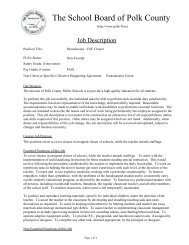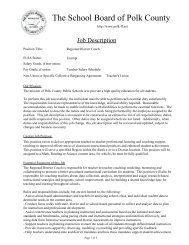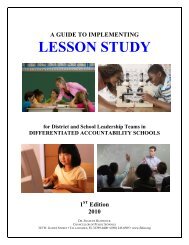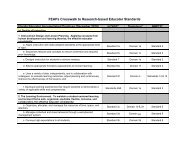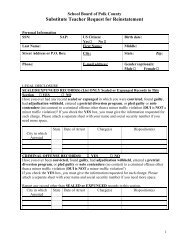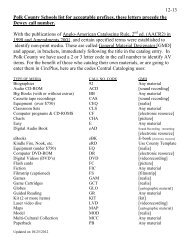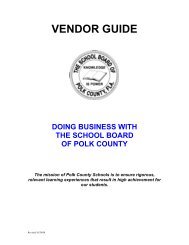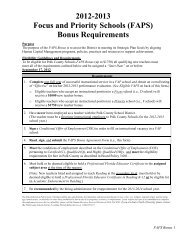Teacher Evaluation System - Polk County School District
Teacher Evaluation System - Polk County School District
Teacher Evaluation System - Polk County School District
Create successful ePaper yourself
Turn your PDF publications into a flip-book with our unique Google optimized e-Paper software.
Appendix B<br />
6A‐5.065 The Educator Accomplished Practices.<br />
(1) Purpose and Foundational Principles.<br />
(a) Purpose. The Educator Accomplished Practices are set forth in rule as Florida’s core standards for<br />
effective educators. The Accomplished Practices form the foundation for the state’s teacher<br />
preparation programs, educator certification requirements and school district instructional personnel<br />
appraisal systems.<br />
(b) Foundational Principles. The Accomplished Practices are based upon and further describe three (3)<br />
essential principles:<br />
1. The effective educator creates a culture of high expectations for all students by promoting<br />
the importance of education and each student’s capacity for academic achievement.<br />
2. The effective educator demonstrates deep and comprehensive knowledge of the subject<br />
taught.<br />
3. The effective educator exemplifies the standards of the profession.<br />
(2) The Educator Accomplished Practices. Each effective educator applies the foundational principles<br />
through six (6) Educator Accomplished Practices. Each of the practices is clearly defined to promote a<br />
common language and statewide understanding of the expectations for the quality of instruction and<br />
professional responsibility.<br />
(a) Quality of Instruction.<br />
1. Instructional Design and Lesson Planning. Applying concepts from human development and<br />
learning theories, the effective educator consistently:<br />
a. Aligns instruction with state‐adopted standards at the appropriate level of rigor;<br />
b. Sequences lessons and concepts to ensure coherence and required prior knowledge;<br />
c. Designs instruction for students to achieve mastery;<br />
d. Selects appropriate formative assessments to monitor learning;<br />
e. Uses diagnostic student data to plan lessons; and<br />
f. Develops learning experiences that require students to demonstrate a variety of applicable<br />
skills and competencies.<br />
2. The Learning Environment. To maintain a student‐centered learning environment that is safe,<br />
organized, equitable, flexible, inclusive, and collaborative, the effective educator consistently:<br />
a. Organizes, allocates, and manages the resources of time, space, and attention;<br />
b. Manages individual and class behaviors through a well‐planned management system;<br />
c. Conveys high expectations to all students;<br />
d. Respects students’ cultural linguistic and family background;<br />
59



